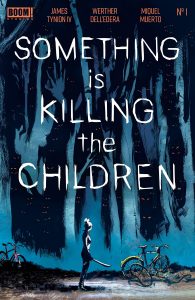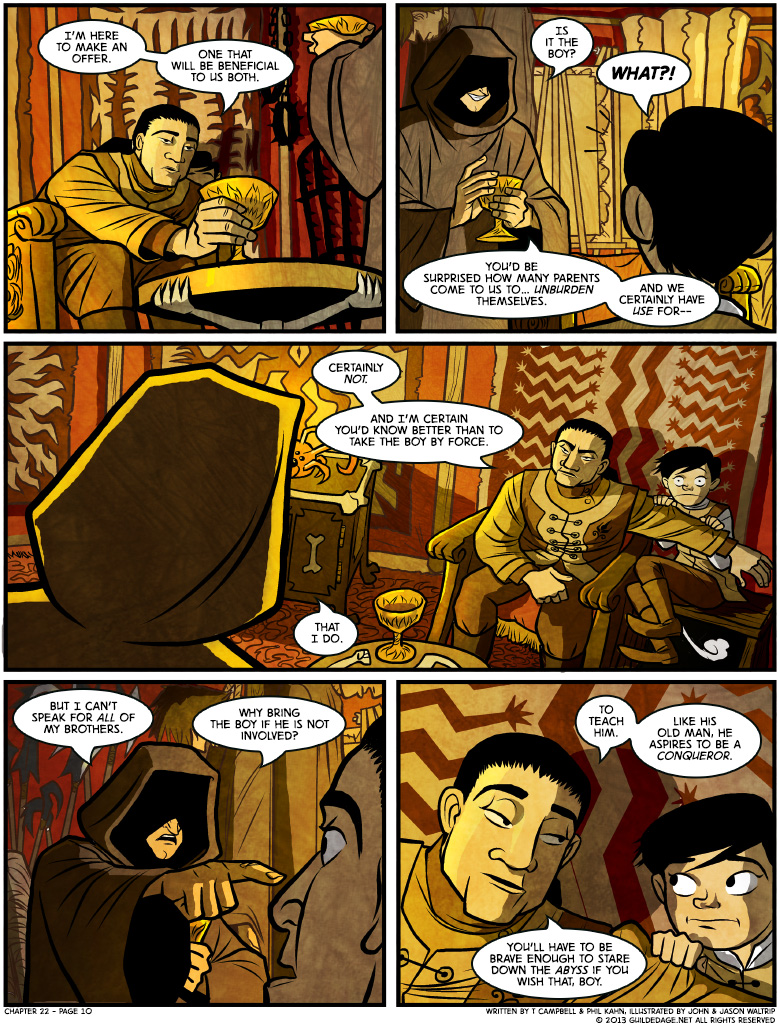Annotated 22-10
 Points to Phil for not only making Tom genuinely creepy here but for actually making me briefly concerned for Taro. If you’ve read ahead or remember Gnometown, you might consider it regrettable that some rando cultist didn’t just sneak-grab Taro and insta-sacrifice him before Iwatani Sr. could stop him. And in the broader sense, it probably would be better for the world if that happened. But in this moment, Taro’s arrogance and bloodlust are nowhere to be found, and his crimes aren’t that fresh in our minds. He’s just a scared boy, and it feels wrong to threaten a scared boy.
Points to Phil for not only making Tom genuinely creepy here but for actually making me briefly concerned for Taro. If you’ve read ahead or remember Gnometown, you might consider it regrettable that some rando cultist didn’t just sneak-grab Taro and insta-sacrifice him before Iwatani Sr. could stop him. And in the broader sense, it probably would be better for the world if that happened. But in this moment, Taro’s arrogance and bloodlust are nowhere to be found, and his crimes aren’t that fresh in our minds. He’s just a scared boy, and it feels wrong to threaten a scared boy.
Plus, the notion of parents “unburdening themselves” of children, even children with some sociopathic tendencies, reminds me of a short horror story called “Letters from Camp” by Al Sarrantonio, which kept me awake a few nights as a teenager. Look that one up if you must, but don’t say I didn’t warn you.
This kind of “Extreme Take Your Son to Work Day” is actually not a bad idea for the future Iwatani envisions for his son. His biggest mistake, as usual, is to assume his son is just a miniature version of himself at the same age and therefore blind himself to whom Taro’s really becoming.











Those first two balloons in Panel 2 really crack me up. I just imagine Taro emitting a comically loud and long “WHAAAAAAAT?!”
And to think how much misery would be saved if Taro had been “unburdened”.
I actually worry what sort of mystical energies the cultists would have acquired through the sacrifice of Taro.
It may have been exchanging the bubonic plague for the cholera.
What a perfect place for Itwani to hire some mercs who people would kill without even questioning why they’d do something. And even if they did, and you somehow managed to get a straight answer out of them, you’d never expect a nobleman to in a doomsday cult. Heck, they might think they’re lying.
Man is genius (or at least very damn smart) for subtlety. His son, not so much.
“the notion of parents “unburdening themselves” of children”
…goes back to (at least) 1729 when Jonathan Swift published A Modest Proposal (which I suspect was Phil’s inspiration).
Parents selling children they couldn’t afford to feed to slavers has been a thing for as long as there has been slavery. Selling them to human-sacrificing, murder-happy doomsday cultists would probably be near the bottom of any parent’s list of preferred buyers though. At that point it’s less a “Starve with me or maybe not die with someone else” choice, and more of a “Yeah, they’re going to die no matter what, so how can I get enough out of it to maybe save some of the others” choice…
Kind of paints a pretty stark picture of what life is like for the lower classes in Arkerra. Due to who the main characters are we only get to see the upper levels of society in any detail, but things like this make it seem like they’re basically a third-world civilization in the very early stages of industrialization where simply getting enough to eat every day is still very much the primary concern on most peoples’ minds.
And then there’s the Hansel & Gretel deal.
And then we had real-life religions where human sacrifice was an expected and accepted occurrence.
Sure, the sacrifices were either slaves, prisoners of war, or volunteers.
But children were volunteered by their parents.
And the poverty level of the family has nothing to do with it. It was socially expected.
Not that it didn’t happen anywhere, but as we’re collecting more archaeological evidence we’re finding that a substantial portion of the historical accounts of places that engaged in sacrificing their own children were actually propaganda spread by their enemies. In the ancient world the child mortality rate often hovered near 80% just on its own. Cultures that engaged in deliberate killing of otherwise healthy children tended to die out rather rapidly.
So like ancient Carthage cremated their dead children and erected small memorial stones because there were so many dead children that a full burial ritual was just too expensive for all but the wealthiest families. The Romans, to maintain popular support for their endless and expensive wars against Carthage turned that into legends of children being burnt alive as offerings to dark gods that have colored the histories of Carthage for 2000 years.
I think that the ideal situation for most parents would have been to send them of as an apprentice for some form of trade. That way, they don’t have the guilt of selling their kid and the possibility of the kid having a survivable future.
And as societies became wealthier that is indeed the pattern that emerged. Even for the middle-class families who could have afforded to keep their children at home. Sending them off to learn a trade at the hands of a master was what they did instead of highschool and college educations. Arguably it worked better than what we do now.
In retrospect, it does feel very good to see Taro so genuinely scared here.